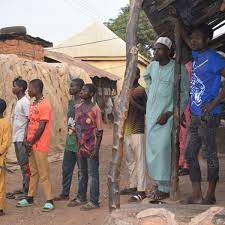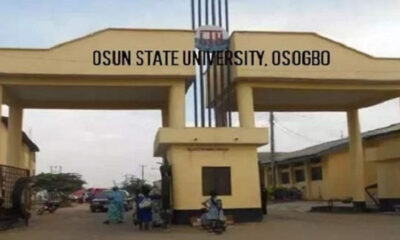Sani Abdullahi, the headteacher, however, told Kaduna Governor Uba Sani when he visited the town that the total number of those missing after a headcount was 287.
metro
Updated: Kaduna communities face mass exodus after kidnap of 287 pupils

Kaduna communities face mass exodus after kidnap of 287 pupils
Fear has enveloped many communities in Kaduna State and mass exodus is imminent after the kidnap of 287 pupils from their Kuriga community school in the Chikun Local Government Area of the state on Thursday.
Although the state government said it was working with security agencies combing the bushes for the missing pupils and a teacher taken away by the marauders, there is confusion in many of the communities as locals are beginning to seek refuge elsewhere.
The latest abduction came about twenty-four hours after Boko Haram insurgents kidnapped about 300 women in Borno State and set ablaze their internally displaced persons’ (IDPs) camp.
Reports indicate that the incident happened at about 8.30 am when the pupils were about to conclude the morning assembly.

A local was reported by Daily Trust as saying the bandits came from different parts of the village and encircled the school premises.
He said, “The bandits kidnapped over 200, both primary school pupils and secondary students. The secondary school students were moved from a location outside the community to the primary school due to the fear of bandits’ attack.
“They also went away with a teacher, named Isa. They shot one student, identified simply as Rabilu, who was rushed to Birnin Gwari hospital. He survived.
“They (bandits) gathered all the children and forced them to move towards the North Eastern part of the community, on foot.
“The entire community is in deep confusion. Every household was affected. Besides, we are all related. We are also afraid of renewed attacks because the bandits might be hiding somewhere to wait for security operatives who may come on rescue mission.
“Kuriga is in serious confusion. The situation is very unpleasant. The vigilante here are not well equipped. The security operatives are stationed at Udawa which is far. We also have network problem.”
“We will ensure that every child will come back. We are working with the security agencies,” the governor told villagers in the area located 55 miles (89 kilometers) from the capital.
Police react
Mansir Hassan, spokesperson for the Kaduna State police command, confirmed the incident.
“I’m attending a security meeting but the police tactical team has been deployed to go after the criminals by combing the bushes to rescue the victims,” he said.
Senator Shehu Sani, said on his X page, “It’s tragic to hear that 232 students have just been kidnapped in Kuriga village, Chikun LG in Kaduna State.
“It’s the same village where a school principal, Idris Sufyan, was killed and his wife kidnapped over a month ago. However, I’m optimistic their freedom will be secured.”
The Federal Government came up with the Safe Schools Initiative to stave off further invasion of schools and kidnap of students.
The project came into being after the global outcry that followed the abduction of students of Government Girls College in Chibok, Borno State in 2014.
metro
INEC notifies Natasha, Senate of recall petition

INEC notifies Natasha, Senate of recall petition
Suspended Senator Natasha Akpoti-Uduaghan yesterday got a memo from the Independent National Electoral Commission (INEC).
It is a notification to her of the receipt of petition from voters in her Constituency demanding her recall.
The same notification was sent by the electoral agency to the leadership of the Senate.
The Commission also unfolded plans to scrutinise the signatures of the petitioners to ascertain their authenticity.
INEC National Commissioner and Chairman of the Information and Voter Education Committee, Sam Olumekun, confirmed in a statement that the addresses, phone numbers and email addresses of representatives of the petitioners, which were initially not attached, had been submitted to the commission.
On Tuesday, the Commission had picked holes in the petition, pointing out that it failed to meet the standard because the addresses and phone numbers of the petitioners’ representatives were not provided as required by law.
Exuding confidence after INEC’s confirmation that that aspect of recall requirements had been met, the petitioners said the recall request was meant to correct what they described as the error of wrong choice.
READ ALSO:
- FG declares public holidays for Eid-el-Fitr
- JUST-IN: Ex-Oyo gov Ajimobi’s first child Bisola dies At 42
- Crisis hits LagRide, drivers threaten protest as operators move to withdraw vehicles
Olumekun said: “Further to the statement issued yesterday, Tuesday 25th March 2025, the Commission hereby confirms that the contact address of representatives of the petitioners, their telephone numbers and e-mail addresses have now been provided in a letter addressed to the Chairman of the Commission, dated today Wednesday 26th March 2025.
“As provided in Clause 2(a) of the Commission’s Regulations and Guidelines for Recall 2024, a letter has been written to notify the Senator sought to be recalled about the receipt of the petition and delivered to her official address.
“The same letter has been copied to the presiding officer of the Senate and published on the Commission’s website.
“The next step is to scrutinise the list of signatories submitted by the petitioners to ascertain that the petition is signed by more than one half (over 50%) of the registered voters in the Constituency.
“This will be done in the coming days. The outcome, which will be made public, shall determine the next step to be taken by the Commission. We once again reassure Nigerians that the process will be open and transparent.”
Senator Akpoti-Uduaghan, is serving a six-month suspension for misconduct and abuse of the Senate rules after her seat was changed.
She went ahead to make allegations of sexual harassment against Senate President Godswill Akpabio.
On Wednesday, Zubairu Yakubu, who wrote the petition, accompanied by former Education Minister Dr. Oby Ezekwesili, appeared before the Senate Committee on Ethics, Code of Conduct and Public Petitions sitting to defend the allegations.
However, the Committee threw out her petition, saying that the matter was already a subject of litigation.
During the meeting, Dr Ezekwesili and Senator Onyekachi Nwebonyi (Ebonyi North) clashed, exchanging hot words.
Senator Akpoti-Uduaghan has been junketing between the United States and Europe, granting interview against Senate president.
INEC notifies Natasha, Senate of recall petition
metro
FG declares public holidays for Eid-el-Fitr

FG declares public holidays for Eid-el-Fitr
The Federal Government has declared Monday, March 31, and Tuesday, April 1, 2025, as public holidays in celebration of Eid-el-Fitr.
The announcement was made by the Minister of Interior, Dr. Olubunmi Tunji-Ojo, on behalf of the government.
He urged Muslims across the country to use the period for prayers, reflection, and acts of kindness, emphasizing the importance of peace, unity, and national development.
In a statement on Wednesday by the ministry’s Permanent Secretary, Magdalene Ajani, the minister congratulated Muslims on the successful completion of the Ramadan fast, highlighting the significance of the holy month in fostering self-discipline, compassion, and spiritual renewal.
READ ALSO:
- JUST-IN: Ex-Oyo gov Ajimobi’s first child Bisola dies At 42
- Crisis hits LagRide, drivers threaten protest as operators move to withdraw vehicles
- Rivers administrator Ibas fires Fubara’s political appointees
Tunji-Ojo called on all Muslims to continue embodying the virtues of love, generosity, and peace, emphasising the need for national unity and religious harmony.
He also urged Nigerians to use the festive period to pray for the country’s peace, stability, and prosperity.
“As we celebrate Eid-el-Fitr, let us reflect on the lessons of Ramadan, embrace one another with love and forgiveness, and work together to build a more united and prosperous Nigeria,” the minister stated.
He further encouraged citizens to celebrate safely and responsibly, while extending acts of kindness to the less privileged, in line with the values of Ramadan and Eid.
On behalf of the Federal Government, Tunji-Ojo wished all Muslim faithful a joyous Eid Mubarak and prayed that the blessings of the season bring happiness and fulfilment to everyone.
FG declares public holidays for Eid-el-Fitr
metro
JUST-IN: Ex-Oyo gov Ajimobi’s first child Bisola dies At 42

JUST-IN: Ex-Oyo gov Ajimobi’s first child Bisola dies At 42
Busola, the first child of former Oyo Governor, late Abiola Ajimobi is dead.
The Nation gathered that Bisola, 42, died after a brief illness in the UK.
She was a Special Adviser to Minister of Budget and Planning, Atiku Bagudu.
She was married to Kolapo Kola-Daisi, with whom she shared blessed three children.
Former Senator Teslim Folarin confirmed the incident.
READ ALSO:
- Crisis hits LagRide, drivers threaten protest as operators move to withdraw vehicles
- Rivers administrator Ibas fires Fubara’s political appointees
- Natasha: Murray-Bruce slams Atiku, defends Akpabio
He wrote on Facebook:
“I am deeply saddened to receive the news of the passing of Mrs. Bisola Kola-Daisi (Nee Ajimobi), the beloved daughter of my cousin, the late Senator Isiaq Abiola Ajimobi, and former First Lady of Oyo State, Her Excellency (Dr.) Florence Ajimobi. Bisola’s untimely death has left an unfillable void in our hearts, and I can only imagine the pain of a parent burying their child.
“As someone who had the privilege of knowing Bisola as a dear family member – she was like a daughter to me – her passing has left me with a profound sense of personal loss.
“I extend my heartfelt condolences to the Ajimobi family, particularly former First Lady, H.E Florence Ajimobi . May God grant us the strength and fortitude to bear this irreparable loss.
May Bisola’s soul rest in perfect peace.”
JUST-IN: Ex-Oyo gov Ajimobi’s first child Bisola dies At 42
-

 metro2 days ago
metro2 days agoAttack on Mufty of Ilorin: Onikijipa Family Charges Stakeholders to Call Sheikh Habibullahi Al-Ilory to Order
-

 Health3 days ago
Health3 days agoNigerian doctor pioneers W’Africa first robotic prostate cancer surgery
-

 metro13 hours ago
metro13 hours agoRivers administrator Ibas fires Fubara’s political appointees
-

 metro3 days ago
metro3 days agoFubara: Supreme Court reacts to photo of Justice Agim with Wike
-

 metro3 days ago
metro3 days agoUNIOSUN mourns as 5 students die in auto crash
-

 metro13 hours ago
metro13 hours agoJUST-IN: Ex-Oyo gov Ajimobi’s first child Bisola dies At 42
-

 metro1 day ago
metro1 day agoHow ritualists, native doctor drugged, murdered underage sisters in PH – Police
-

 International2 days ago
International2 days agoCanada removes bonus ranking points for job offers in Express Entry system













